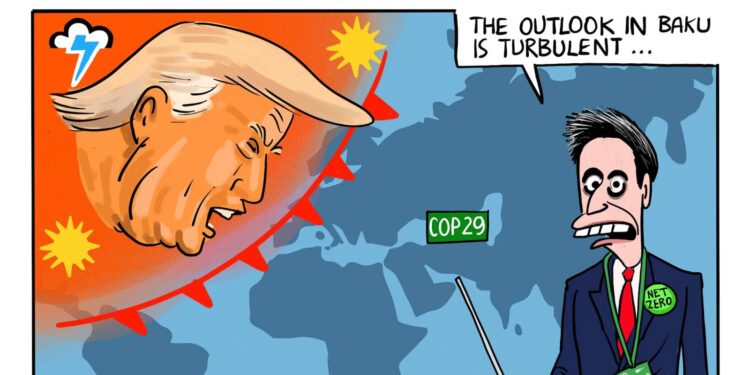Spare a thought this morning for Justin Rowlatt of the BBC as he sits down for breakfast in Baku wondering how he will spin the looming disaster of the now Trump-wrecked COP29, which begins today. In happier days, the thought of wasting billions of dollars on free handouts, or climate reparations, as they are laughably called, would have warmed his heart. In happier days, western governments could pretend to be saving the planet by rebadging foreign aid for so-called climate projects. Few seemed to take their climate obligations more seriously than the Belgians who funded a romantic film about a green activist and a rugby-playing logger set in a rainforest. Sadly, to date, your correspondent has been unable to catch this eco-classic when the tree hugger met the hunk with the big log. The Belgians justified the movie as ‘climate finance’ because it “touches on deforestation”.
The latest COP in Azerbaijan is all about money – a massive annual trillion dollar heist planned by global elites as a transfer from poor people in rich countries to rich people in poor countries. But Trump’s election has blown these plans out of the water. America’s commitment to the Paris agreement, crucial to much of this funding, will soon be ditched by Trump along with green boondoggles of every variety. Can Rowlatt and co. step up to the plate and put the best possible face on the new reality? Rarely can a BBC correspondent have faced a more difficult assignment.
David Wojick of CFACT is not sanguine about the prospects of the useful idiots covering the conference for mainstream media. “That people take this nonsense seriously speaks volumes about the unreality of the UN climate programme. But it will be great fun to watch them hit the NO WAY wall,” he says.
If all goes well at COP 29, the Italians will no longer have to save the planet one ice cream at a time. Part of their past climate aid helped an Italian retailer to open a chain of chocolate and gelato stores across Asia. This formed part of the agreement reached in Paris in 2015 that pledged $100 billion a year for climate action in the developing world. In fact, a recent survey by Reuters and Big Local News at Stanford University found that billions of dollars had been spent building new coal- and gas-fired power stations, along with airport and hotel developments. Japan is said to have provided at least $776.3 million to finance three airports including the Borg El Arab development in Egypt. The pragmatic Egyptian climate minister Mohamed Nasr noted that “people have to fly”.
The two largest climate finance contributors to date are the USA and Japan. The researchers found that Japan grants itself a great deal of latitude when it comes to defining climate finance. It provided $2.4 billion to help fund the Matarbari ultra supercritical coal-fired power station in Bangladesh. Apparently, Japan considers Matarbari a project worthy of its climate backing because it uses Japanese technology to generate more energy with less coal. If worrying about carbon dioxide is your thing, you will not be pleased to learn that according to the researchers Matarbari will produce more emissions than the entire city of San Francisco in 2019.
Desperation at the BBC is evident in pre-COP copy with arch eco-activists Matt McGrath and Georgina Rannard stating that world leaders are “hoping to rein in rising temperatures which are making deadly events like the recent floods in Spain far worse”. Note the lack of the usual ‘scientists say’ qualification to make a statement for which there is scant scientific evidence. Desperate times calls for desperate editorial measures. The luxury belief that humans control a chaotic, non-linear atmosphere and can somehow “rein in” temperatures around the world, is a political message that backs the increasingly absurd climate emergency and its death cult Net Zero solution.
Of course, a lot of silly people who claim that you can take hydrocarbons out of a modern industrial economy have gathered in Baku. There are few sillier than mad Ed Miliband, who is rushing headlong into ‘decarbonising’ the U.K.’s electricity grid within the next 60 months. He has been told that there is no reliable back up for intermittent breezes and beams except a full fleet of gas-fired power stations. Since Miliband is also banning new oil and gas exploration, he might care for a meeting with Elnur Soltanov, the Chief Executive of Azerbaijan’s COP team.
We are obliged to J. Rowlatt for reporting that Soltanov is taking the opportunity to promote the country’s burgeoning oil and gas business. It is after all essential to have some access to hydrocarbons if you are too virtuous to drill for them yourself. Or the Mad One might bump into forward planners from the Trump team. There will be plenty of gas available across the pond in the next four years with the incoming President promising to “drill baby drill”. The price may be a little higher than any domestic supply since it needs to be compressed and transported. Since the U.K. will be dealing at the top with a capitalist deal maker President, the price will need to reflect all these costs, and possibly a small premium to help assuage the seller’s conscience of having the customer over a barrel.
One can hardly blame the representatives of developing countries turning up at Baku and asking for free money for bad weather. The island states will be there in force claiming rising sea levels will sweep away their coral and sand bank homes. Again, substantial handouts will help assuage consciences. It must be hard to keep telling these fibs to halfwitted journalists and politicians when all the scientific evidence suggests that most tropical islands in the Pacific are growing by natural accretion. But no doubt the cash will be put to good use building more money-spinning beach resorts.
But there is a more serious and darker side to the climate giving game – the suggestion that it’s a form of climate colonialism. In a recent essay in Watt Up With That?, Charles Rotter noted that global financial institutions and wealthy nations dictate energy policy that prioritises carbon reduction over human development. Across Africa, electricity blackouts are common. The region’s most populous country, Nigeria, is repeatedly plunged into darkness. The World Bank and the International Monetary Fund have curtailed funding for oil and gas projects, while the European Investment Bank has banned support for hydrocarbon projects. Hopefully, help in providing reliable energy to developing countries for electricity, clean water and sanitation may be on its way from the U.S. Under pressure from the Biden administration, American development agencies are reported to have halted backing for overseas hydrocarbon projects. This is likely to change. As Rotter notes, forcing developing nations to rely on unreliable and expensive renewables means that wealthier countries maintain their industrial advantage.
Such sentiments about the underlying wickedness of COP will no doubt have Rowlatt choking over his organic oatmeal.
Chris Morrison is the Daily Sceptic’s Environment Editor.













To join in with the discussion please make a donation to The Daily Sceptic.
Profanity and abuse will be removed and may lead to a permanent ban.